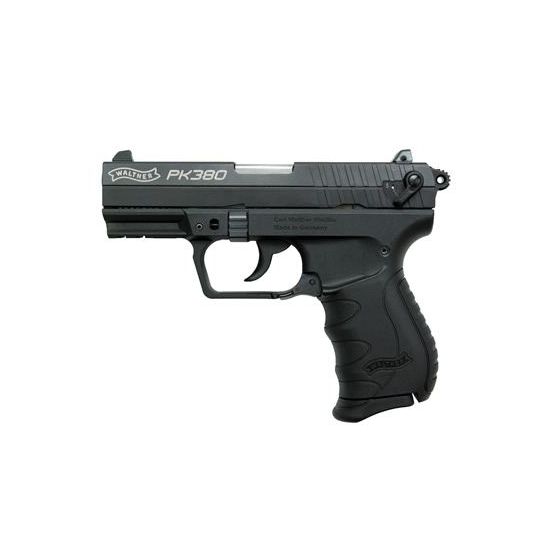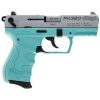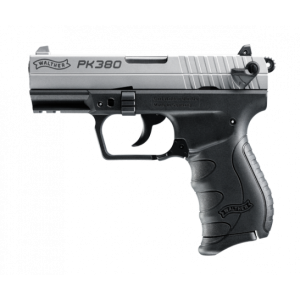Walther PK380 5050308 WAN40001 For Sale
$349.99
The Walther PK380, model number 5050308, is a precision-engineered compact pistol designed for enhanced shooting performance, particularly for fans of the Walther P22. This pistol offers the power of .380 caliber in a manageable size, featuring a lightweight polymer grip for comfortable handling even during extended use, making it suitable for both beginners and seasoned shooters. It boasts an external hammer for a classic feel, with ambidextrous magazine release and manual safety to accommodate all users. The PK380 includes a Picatinny-style accessory rail for customization with various compatible add-ons. Each unit comes with a magazine, ready for immediate use, and showcases German craftsmanship at an appealing price point, embodying the Walther brand’s commitment to quality and performance without compromise.
Is the Walther PK380 discontinued?
Yes, the Walther PK380 has been discontinued.
What is the recall on the Walther PK380?
The Walther PK380 was recalled due to a potential safety issue involving the possibility of the firearm accidentally discharging. This issue was identified as a result of engagement between the slide and the safety mechanism. This recall was initiated out of an abundance of caution to prevent accidental firings. If you own a Walther PK380, it is advised to contact Walther for further instructions on how to resolve any issues related to this recall. For the most accurate and detailed information, it’s recommended to visit Walther’s official website or contact their customer service directly.
Why is the Walther PPK illegal?
The Walther PPK may be restricted or considered illegal in certain jurisdictions due to local firearm laws and regulations. In the United States, for instance, the Gun Control Act of 1968 implemented restrictions on the importation of certain firearms based on a points system that assesses their features and characteristics. The Walther PPK initially failed to meet these criteria because of its size and weight.
Additionally, specific state or local laws may impose further restrictions or bans on certain types of firearms, including the PPK. Factors such as magazine capacity, caliber, or specific features like a threaded barrel could also influence its legality. To determine the exact reasons for its status in any particular area, consulting the local laws and regulations or speaking with a legal expert in firearms law is advisable.
What is the difference between the Walther PD 380 and the PK380?
The Walther PD 380 and the Walther PK380 refer to the same pistol model, the Walther PK380. The PD 380 is a designation sometimes used to describe the package that includes additional accessories or specifics for a particular market, but the firearm itself remains the PK380. Therefore, there is essentially no difference in the firearm between the two names; any variation would likely relate to marketing, accessory inclusion, or distributor-specific bundles rather than the gun itself.
Why is Walther so expensive?
Walther firearms can be expensive due to several factors, including their reputation for high-quality manufacturing, precision engineering, and reliability. The brand is known for producing firearms with excellent craftsmanship and attention to detail, which can elevate costs. Additionally, Walther has a history of innovation and is often associated with premium materials and finishes, contributing to higher prices. Limited production runs or special editions can also drive up costs due to their exclusivity. Furthermore, import taxes and the cost of distribution can also factor into the final retail price in markets outside of Germany.
What pistol did 007 carry?
James Bond, also known by his code number 007, is famously known for carrying the Walther PPK pistol in many of the films and novels.
Is Walther as good as Glock?
The comparison between Walther and Glock firearms often depends on personal preference and specific needs. Both brands produce reliable and high-quality firearms, but they have different characteristics:
1. **Ergonomics**: Walther handguns, such as the PPQ and the PDP, are often praised for their ergonomic grip and comfortable handling. Glock pistols, known for their simplicity and functionality, have a more utilitarian design that some find less comfortable.
2. **Trigger**: Walther pistols are frequently noted for having smoother and lighter triggers out of the box compared to Glock, which may require aftermarket modifications to achieve a similar feel.
3. **Reliability**: Both brands have a reputation for reliability. Glocks have a long-standing reputation for enduring various environmental conditions, while Walther also produces reliable firearms, although they may not have the same extensive track record in diverse conditions as Glock.
4. **Customization and Aftermarket Support**: Glock has a significant edge in terms of aftermarket support and customization options. There are numerous parts and accessories available for Glock models, allowing for extensive customization.
5. **Use Case**: Your intended use (e.g., self-defense, competition shooting, law enforcement, etc.) can heavily influence which brand is more suitable for you. Glocks are extremely popular with law enforcement and military units worldwide, while Walther is also respected for personal defense and competition.
Ultimately, the decision depends on personal choice and specific circumstances. It may be beneficial to try firearms from both brands to see which feels more comfortable and suits your needs.
Where is the Walther PK380 made?
The Walther PK380 is manufactured in Ulm, Germany.
Does a Walther PK380 have a safety?
Yes, the Walther PK380 has a manual safety lever located on the slide of the firearm.
What does ACP stand for in ammo?
ACP stands for “Automatic Colt Pistol” in the context of ammunition.
What is the problem with the Walther PPK?
The Walther PPK, while a classic and iconic handgun, has a few commonly discussed issues:
1. **Capacity:** It has a relatively low ammunition capacity, typically 6 or 7 rounds, which may be insufficient for some users.
2. **Ergonomics:** The small size can make it challenging for individuals with larger hands to grip comfortably.
3. **Recoil:** Due to its compact size and blowback operation, the perceived recoil can be significant compared to larger handguns.
4. **Sights:** The original models have small, less visible sights, which can affect aiming accuracy.
5. **Trigger Pull:** The double-action trigger pull can be heavy and less smooth compared to modern striker-fired pistols.
6. **Hammer Bite:** Some users experience “hammer bite,” where the web of the thumb can be pinched by the hammer during recoil.
These factors might make it less preferable for some users compared to more modern alternatives.
How is Walther pronounced?
“Walther” is typically pronounced as “VAHL-ter” in German, where the “W” is pronounced like an English “V.” In English, it might be pronounced as “WAWL-ther” with the “W” maintaining its English pronunciation.
Be the first to review “Walther PK380 5050308 WAN40001” Cancel reply
Related products
Walther PK380
Walther PK380




Reviews
There are no reviews yet.